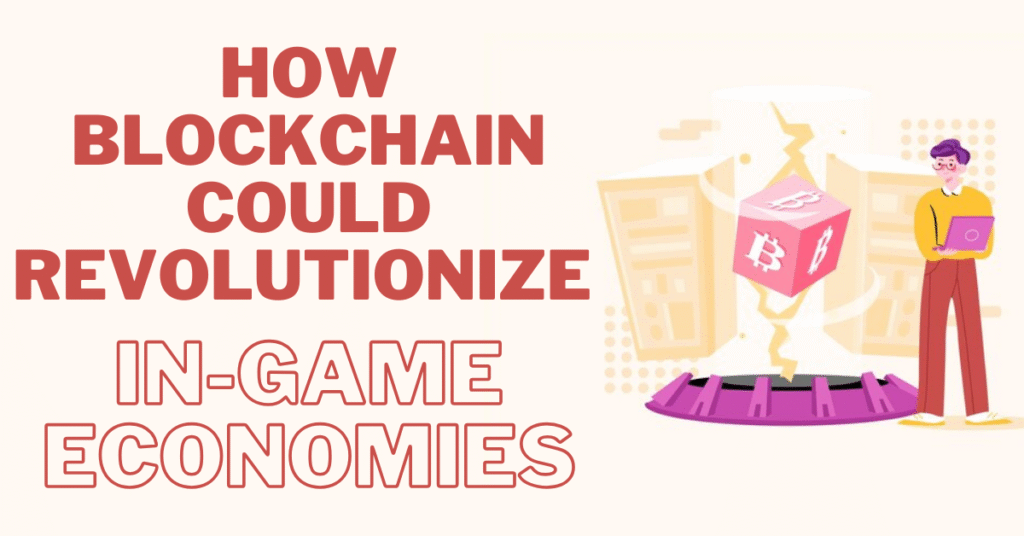
In the past few years, gaming technology has evolved brilliantly, and blockchain is one of the boldest innovations. Bitcoin is often connected with blockchain but it is an order of magnitude more vast. In-game economics could revolutionize blockchain technology, and that’s exciting. In this article, we will discuss the potential for blockchain to enhance security, transparency, and player ownership in in-game economies — problems that are intrinsically tied to what games deliver as value to their players; that is, the ability to interact and engage with works of art both as they appear in games and as works of art outside of game contexts.Know Blockchain TechnologyThe technology that blocks (i.e., Decentralized Distributed Ledger technology, or blockchain) is a way of securely recording transactions across many computers with transparency and immutability, along the lines of a digital ‘block chain’. And transactions are stored on the blockchain in each ‘block’, i.e. they cannot be altered or erased. In game economics that require the safety of the gameplay, trust, and transparency, blockchain is suitable.In-Game Economy RevolutionAsset Ownership by PlayersIn conventional video games, the user’s goods, skins, or cash outside the gaming space is unknown to users. Things in a game are useless when the game closes, or when the player closes it. Blockchain gives players full ownership of the in-game asset. These things are unique and transferable between players, and between games, using non-fungible tokens (NFTs). It gives the participants an autonomy to change the assets and to trade and sell their ones in a decentralized marketplace.Transparent safe transactionsIn-game economy presents an intractable tradeoff between transaction security and preventing fraud. Here, Blockchain solves this problem by recording all transactions transparently and immutably. Players can compare history of asset and check if duplication or hacking took place. In conventional online markets, transparency builds confidence with players and avoids frauds. Blockchain ensures that all transactions, virtual item trades and in-game money purchases are verified.Decentralized economiesIn game economies are managed by game creators and publishers. Cash, item circulation and commerce are regulated. In decentralized economies, blockchain enables markets to be controlled not by developers but by participants. In the context, players may create in game economy rules using smart contracts and having that automatically enforced without any intermediary. This might result in player owned market places where supply and demand dictates in game money and item pricing.Game-to-game compatibilityCross game interoperability is another potential that is really intriguing. In today, each tournament has its own Economy. Transferring in game objects from game to game using blockchain technology may solve this problem. Swords can be used between different games thereby making the experience more fluid. gameplay and in-game asset value increases as interoperability increases. Through cross game products players are able to buy, sell and trade across games further expanding gaming economies.Examples of Real World Blockchain GamingIn several games, blockchain technology is allowing improvement of in game economy. There’s even something like “Axie Infinity” where players can farm, fight, and trade NFT Axies. Axies are sold in a decentralised marketplace, where rarity and demand determines the value. Also, users can purchase, trade and construct NFTs in alternative blockchain-based virtual worlds like “Decentraland” and “The Sandbox”.Not only is Cryptothink planning to launch a blockchain game by 2022 but major gaming firms such as Ubisoft and Square Enix are also getting on the table exploring how blockchain and NFTs can fit into their subsequent releases. The position of the blockchain in gaming will soon grow: these discoveries.Benefits for DevelopersGamers and game creators are the winners of blockchain. Blockchain can mitigate fraud, cheating, protect in game purchase. In addition to that, developers may also set up independent decentralized economies, creating a portion of player transactions. This will open up new business models and revenue streams, freeing up creative approaches to new gameplay instead of in game purchases.Conclusion:Blockchain technology may change the in game economy for the better by giving players more ownership, security and control over their assets. Gaming’s future has the potential to be interesting, and interesting things to me mean that the economy is decentralized crypto. Transaction are transparent, and game A can be easily played against game B. The gaming industry will see some pretty cool changes brought to it by blockchain technology and be able to open some pretty cool new doors for gamers and other creators as well. Blockchain in gaming is a new technology innovation and a shift for virtual economies, away from the game maker towards the player.